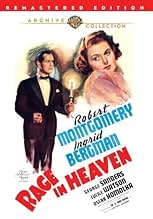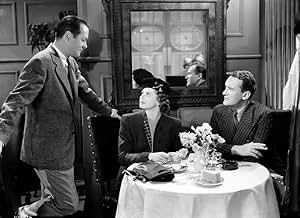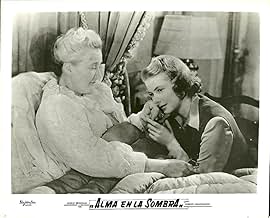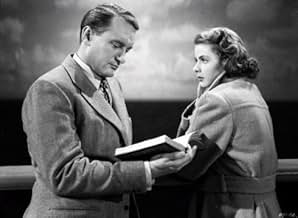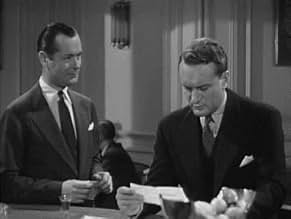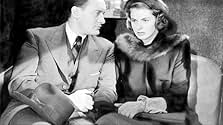ÉVALUATION IMDb
6,4/10
1,4 k
MA NOTE
Ajouter une intrigue dans votre langueRobert Montgomery and George Sanders team up to play against type in this probing psychological thriller that features Ingrid Bergman as the object of their obsessions.Robert Montgomery and George Sanders team up to play against type in this probing psychological thriller that features Ingrid Bergman as the object of their obsessions.Robert Montgomery and George Sanders team up to play against type in this probing psychological thriller that features Ingrid Bergman as the object of their obsessions.
- Prix
- 3 victoires au total
Frederick Worlock
- Solicitor-General
- (as Frederic Worlock)
Ludwig Hardt
- Durand
- (as Ludwig Hart)
Stuart Hall
- Traveling Salesman
- (scenes deleted)
Major McBride
- Bank Clerk
- (scenes deleted)
Clive Morgan
- Traveling Salesman
- (scenes deleted)
Joseph North
- Undertaker
- (scenes deleted)
Wyndham Standing
- Dr. McTernan
- (scenes deleted)
Harry Allen
- Jury Foreman
- (uncredited)
Avis en vedette
The first half of this film is a fascinating portrayal of a Paranoid Psychopath. The second half deteriorates into an in-earnest attempt to deliver a thoughtful look at someone suffering from this form of mental illness.
Ingrid Bergman, in her third Hollywood feature, is the subject of a dangerous obsession from her husband, a wealthy heir, who lacks self-esteem and lives in a constant state of jealously and prone to being easily agitated. Robert Montgomery plays the ticking bomb.
Parenthetically, Montgomery was reportedly unhappy the studio demanded he play the role because he wanted time off and therefore delivered his lines quickly and without much effort. I found this to be, ironically, effective for the character.
The great George Sanders plays the man in most danger of the lead character's pathological illness. Unfortunately, his character is given little to work with in the third act of the film.
There's a scene where a trial is held and the apathy displayed by Sanders (with the exception of one shot) is astonishing.
In the 1940s Hollywood began its fascination with stories focused on psychology. This is one of the first films in that era and unfortunately it was put in the hands of director W. S. Van Dyke, who had the reputation of working quickly and was nicknamed "One-Take Van Dyke." You can see characters trip over lines and a lack of care over the story's plot line.
Oscar Homolka seriously overplays the mental health doctor in the picture. Clearly the rage over the film's miscues should be directed at Van Dyke.
Ingrid Bergman, in her third Hollywood feature, is the subject of a dangerous obsession from her husband, a wealthy heir, who lacks self-esteem and lives in a constant state of jealously and prone to being easily agitated. Robert Montgomery plays the ticking bomb.
Parenthetically, Montgomery was reportedly unhappy the studio demanded he play the role because he wanted time off and therefore delivered his lines quickly and without much effort. I found this to be, ironically, effective for the character.
The great George Sanders plays the man in most danger of the lead character's pathological illness. Unfortunately, his character is given little to work with in the third act of the film.
There's a scene where a trial is held and the apathy displayed by Sanders (with the exception of one shot) is astonishing.
In the 1940s Hollywood began its fascination with stories focused on psychology. This is one of the first films in that era and unfortunately it was put in the hands of director W. S. Van Dyke, who had the reputation of working quickly and was nicknamed "One-Take Van Dyke." You can see characters trip over lines and a lack of care over the story's plot line.
Oscar Homolka seriously overplays the mental health doctor in the picture. Clearly the rage over the film's miscues should be directed at Van Dyke.
''Rage in Heaven'' wasn't a bad movie, but it wasn't good either...... I'm not sure, if it's because of the story, or because of the actors performances...... Ingrid Bergman was fine...... You could tell, that she tried to make the best of it, but there was NO chemistry at all, between her and Robert Montgomery, George Sanders...... Montgomery looks tired, and seems to be sleepwalking through the movie...... He downplayed his mentally disturbed character too much...... He seemed more alert, towards the last half of the film...... From what I read, in Ingrid Bergman's autobiography, she said, that Montgomery was forced to do this movie, so he told her, that he won't act..... That probably explains his bored looks in the movie...... Overall, could've been a better movie, if they rearranged the cast or something.......
James Hilton was not a great novelist, but he was a popular one in the 1930s and 1940s, and two of his books have managed to become minor classics. Both also were the basis of popular films: LOST HORIZON and GOODBYE MR. CHIPS. But, oddly enough, they were not the only Hilton novels that made it to the screen, nor the only two that became classic films. RANDOM HARVEST can be added to his novels that became film classics. And he also wrote his "Crippen" novel, WE ARE NOT ALONE (which starred Paul Muni and Dame Flora Robson), and this film, RAGE IN HEAVEN. In story it actually resembles RANDOM HARVEST a bit: In that film Ronald Colman is an amnesiac from World War I who escapes from an asylum, and eventually turns out to be the head of a large industrial empire. In RAGE IN HEAVEN Robert Montgomery is a paranoid who flees an asylum in France, and turns out to be the head of a large industrial empire. But Colman's character is intelligent and fair minded - a good boss. Montgomery is argumentative, harsh, and (ultimately) incompetent and cowardly. One can say that RAGE IN HEAVEN is the dark side of RANDOM HARVEST.
Robert Montgomery's film career is one of the most aggravating in Hollywood history. He built up a career in the 1930s playing cads and bounders in MGM comedies, with an occasionally good comic hero role (THE LAST OF MRS. CHEYNEY and TROUBLE FOR TWO come to mind). Then he got the plum role of the psychopathic Danny in NIGHT MUST FALL, and an Oscar nomination for best actor in 1937. But he did not get the Oscar (Spencer Tracy did). I have always suspected that had Montgomery won the Oscar he deserved to his name would be properly remembered today, as more than just a good actor who was the father of television's "Samantha", Elizabeth Montgomery. Instead, while he still had some good parts later in his career (many as a director and producer, as well as actor), he never got the recognition he thoroughly deserved.
It is obvious that RAGE IN HEAVEN was meant to be a follow-up "psycho" role for Montgomery, following Danny. But Phillip Morell is not as well done as Danny, probably because NIGHT MUST FALL was a play by Emlyn Williams originally, and so it was easier to transfer it to the screen than Hilton's novel. But then, LOST HORIZON, MR. CHIPS, and RANDOM HARVEST were well done screenplays too. Danny (for all his murderous habits) has his human moments, but Phillip doesn't. Phillip is always under-spoken and wide eyed. He always is on the verge of exploding (and similarly of collapsing - witness the moment the Union leadership force their way into his office to confront him over his unwillingness to settle the labor impasse, and how he just collapses and runs out yelling, "Give them whatever they want!"). A modern treatment might develop his mania somewhat. It is obvious that Hilton understood what paranoids were capable of - the business about the hidden confession in the diary rings true - but it is still not developed enough for the audience to understand. We know that Phillip's father was insane (and committed suicide) but more details are needed.
It was Ingrid Bergman's third or fourth American film. She was slowly inching her way to real stardom (she had touched it opposite Leslie Howard in the Hollywood version of INTERMEZZO), but her performance, while natural, is not very memorable. George Sanders again demonstrates his dependability in any role, here as a good guy almost destroyed by his mad friend. Oscar Homolka does a good job as the asylum head, whose assistance to Bergman saves Sanders in the end. It is not as good a film as it should have been with a better laid out script, but it is watchable one or two times.
Robert Montgomery's film career is one of the most aggravating in Hollywood history. He built up a career in the 1930s playing cads and bounders in MGM comedies, with an occasionally good comic hero role (THE LAST OF MRS. CHEYNEY and TROUBLE FOR TWO come to mind). Then he got the plum role of the psychopathic Danny in NIGHT MUST FALL, and an Oscar nomination for best actor in 1937. But he did not get the Oscar (Spencer Tracy did). I have always suspected that had Montgomery won the Oscar he deserved to his name would be properly remembered today, as more than just a good actor who was the father of television's "Samantha", Elizabeth Montgomery. Instead, while he still had some good parts later in his career (many as a director and producer, as well as actor), he never got the recognition he thoroughly deserved.
It is obvious that RAGE IN HEAVEN was meant to be a follow-up "psycho" role for Montgomery, following Danny. But Phillip Morell is not as well done as Danny, probably because NIGHT MUST FALL was a play by Emlyn Williams originally, and so it was easier to transfer it to the screen than Hilton's novel. But then, LOST HORIZON, MR. CHIPS, and RANDOM HARVEST were well done screenplays too. Danny (for all his murderous habits) has his human moments, but Phillip doesn't. Phillip is always under-spoken and wide eyed. He always is on the verge of exploding (and similarly of collapsing - witness the moment the Union leadership force their way into his office to confront him over his unwillingness to settle the labor impasse, and how he just collapses and runs out yelling, "Give them whatever they want!"). A modern treatment might develop his mania somewhat. It is obvious that Hilton understood what paranoids were capable of - the business about the hidden confession in the diary rings true - but it is still not developed enough for the audience to understand. We know that Phillip's father was insane (and committed suicide) but more details are needed.
It was Ingrid Bergman's third or fourth American film. She was slowly inching her way to real stardom (she had touched it opposite Leslie Howard in the Hollywood version of INTERMEZZO), but her performance, while natural, is not very memorable. George Sanders again demonstrates his dependability in any role, here as a good guy almost destroyed by his mad friend. Oscar Homolka does a good job as the asylum head, whose assistance to Bergman saves Sanders in the end. It is not as good a film as it should have been with a better laid out script, but it is watchable one or two times.
This film, based on a James Hilton novel, is not often seen these days. In part, the material Christopher Isherwood extracted from the book doesn't make a good movie. As directed by W. S. Van Dyke, the film seems to have been sabotaged by its star, Robert Montgomery, who made no secret he didn't want to be in the picture. It's a shame because the rest of the players are evidently acting in a different movie.
The melodrama has some interesting things going for it. First there is the luminous appearance of Ingrid Bergman in her third Hollywood film. Also, George Sanders has one of the best roles he ever played in the movies. Both Ms. Bergman and Mr. Sanders are the reason for watching. Lucile Watson, Oscar Homolka and Philip Merivale, among others, make great contributions to the film.
While this is not by any means a horrible film, it could have been improved if only Mr. Montgomery, a welcome presence in any movie, would have done a better job inter acting with the rest and following direction.
The melodrama has some interesting things going for it. First there is the luminous appearance of Ingrid Bergman in her third Hollywood film. Also, George Sanders has one of the best roles he ever played in the movies. Both Ms. Bergman and Mr. Sanders are the reason for watching. Lucile Watson, Oscar Homolka and Philip Merivale, among others, make great contributions to the film.
While this is not by any means a horrible film, it could have been improved if only Mr. Montgomery, a welcome presence in any movie, would have done a better job inter acting with the rest and following direction.
I guess I'll be the resident moron of this film's comment section. I liked Rage in Heaven. It was entertaining, interesting, and involving.
I realize Robert Montgomery phoned in his role. His complete detachment makes the character evil rather than sick, and one cannot feel sympathy for him, if we were ever supposed to. The biggest problem is that his flat line readings and cool demeanor make it unbelievable that Bergman married a man so completely lacking in self-esteem, charm, and ardor.
The very young, pre-superstar Ingrid Bergman is marvelous - very fresh and vibrant in the beginning, her personality becoming more somber after a short time being married to Montgomery. And who can blame her. George Sanders is excellent, his portrayal possessing all the charm and passion Montgomery lacks.
As far as this plot being contrived, perhaps, but it was also clever. The original ending of "Fatal Attraction" was based on the same idea. Seen in today's modern perspective "Rage in Heaven" is most interesting. The obsession that Phillip had for Wade - very bizarre indeed!
I realize Robert Montgomery phoned in his role. His complete detachment makes the character evil rather than sick, and one cannot feel sympathy for him, if we were ever supposed to. The biggest problem is that his flat line readings and cool demeanor make it unbelievable that Bergman married a man so completely lacking in self-esteem, charm, and ardor.
The very young, pre-superstar Ingrid Bergman is marvelous - very fresh and vibrant in the beginning, her personality becoming more somber after a short time being married to Montgomery. And who can blame her. George Sanders is excellent, his portrayal possessing all the charm and passion Montgomery lacks.
As far as this plot being contrived, perhaps, but it was also clever. The original ending of "Fatal Attraction" was based on the same idea. Seen in today's modern perspective "Rage in Heaven" is most interesting. The obsession that Phillip had for Wade - very bizarre indeed!
Le saviez-vous
- AnecdotesW.S. Van Dyke took over the direction of the movie from Robert B. Sinclair, who became ill shortly after shooting began. Van Dyke was in the Marines, but was granted a 14-day leave to finish the picture. Neither Sinclair nor Van Dyke was available for re-takes, which were then directed by Richard Thorpe.
- GaffesThe movie commences with a quote, "Heaven hath no rage like love to hatred turned", which it attributes to Milton. The quote is in fact from William Congreve's play "The Mourning Bride".
- Citations
Stella Bergen: My life is like this clearing. Nice and peaceful with paths leading in all directions. Only, I don't know which one to take.
- ConnexionsFeatured in Ingrid (1984)
Meilleurs choix
Connectez-vous pour évaluer et surveiller les recommandations personnalisées
- How long is Rage in Heaven?Propulsé par Alexa
Détails
- Durée1 heure 25 minutes
- Couleur
- Rapport de forme
- 1.37 : 1
Contribuer à cette page
Suggérer une modification ou ajouter du contenu manquant

Lacune principale
By what name was Rage in Heaven (1941) officially released in Canada in English?
Répondre

